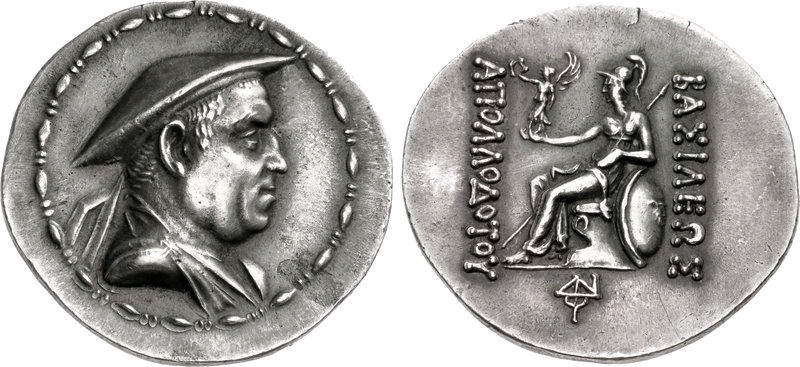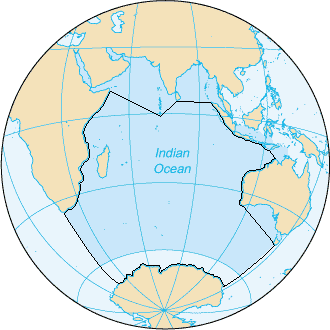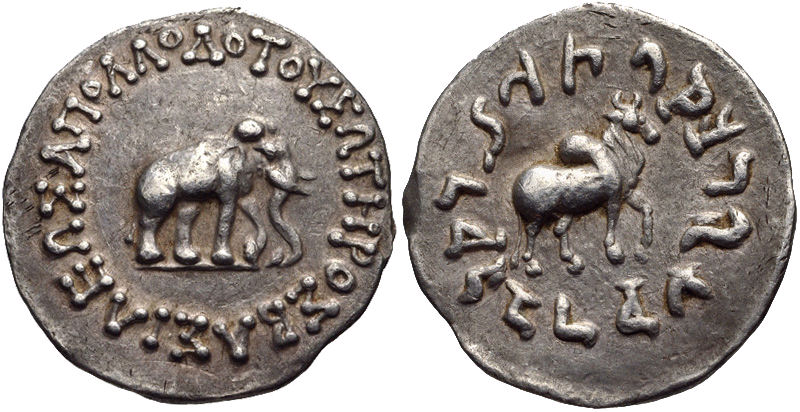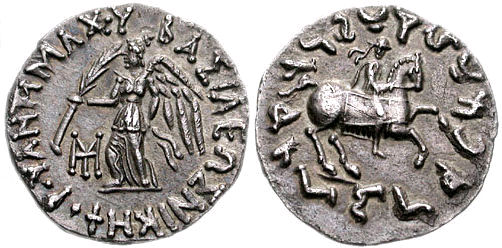|
Apollodotus I
Apollodotus I ( Greek: ) Prakrit in the Kharoshti script: ''maharajasa apaladatasa tratarasa'') was an Indo-Greek king between 180 BC and 160 BC or between 174 and 165 BC (first dating Osmund Bopearachchi and R. C. Senior, second dating Boperachchi) who ruled the western and southern parts of the Indo-Greek kingdom, from Taxila in Punjab to the areas of Sindh and possibly Gujarat. Ruler of the Indo-Greek kingdom Apollodotus was not the first to strike bilingual coins outside Bactria, but he was the first king who ruled in India only, and therefore the founder of the proper Indo-Greek kingdom. According to W. W. Tarn, Apollodotus I was one of the generals of Demetrius I of Bactria, the Greco-Bactrian king who invaded northwestern India after 180 BC. Tarn was uncertain whether he was a member of the royal house. It is possible he was an illegitimate son of Euthydemus, making him Demetrius’ half brother. Later authors largely agree with Tarn's analysis, though wit ... [...More Info...] [...Related Items...] OR: [Wikipedia] [Google] [Baidu] |
Indo-Greek
The Indo-Greek Kingdom, or Graeco-Indian Kingdom, also known historically as the Yavana Kingdom (Yavanarajya), was a Hellenistic-era Greek kingdom covering various parts of Afghanistan and the northwestern regions of the Indian subcontinent (parts of modern-day Pakistan and northwestern India). This kingdom was in existence from ca. 200 BC to ca. 1 BC. During its existence the kingdom was ruled over by 30 successive kings. Menander I, being the most well known amongst the Indo-Greek kings, is often referred to simply as ''“Menander,”'' despite the fact that there was indeed another Indo-Greek King known as Menander II. Menander I's capital was at Sagala in the Punjab (present-day Sialkot). The kingdom was founded when the Graeco-Bactrian king Demetrius (and later Eucratides) invaded India from Bactria in 200 BC. The Greeks in the Indian Subcontinent were eventually divided from the Graeco-Bactrians centered on Bactria (now the border between Afghanistan and Uzbe ... [...More Info...] [...Related Items...] OR: [Wikipedia] [Google] [Baidu] |
Alexander The Great
Alexander III of Macedon ( grc, Ἀλέξανδρος, Alexandros; 20/21 July 356 BC – 10/11 June 323 BC), commonly known as Alexander the Great, was a king of the ancient Greek kingdom of Macedon. He succeeded his father Philip II to the throne in 336 BC at the age of 20, and spent most of his ruling years conducting a lengthy military campaign throughout Western Asia and Egypt. By the age of thirty, he had created one of the largest empires in history, stretching from Greece to northwestern India. He was undefeated in battle and is widely considered to be one of history's greatest and most successful military commanders. Until the age of 16, Alexander was tutored by Aristotle. In 335 BC, shortly after his assumption of kingship over Macedon, he campaigned in the Balkans and reasserted control over Thrace and Illyria before marching on the city of Thebes, which was subsequently destroyed in battle. Alexander then led the League of Corinth, and used his authori ... [...More Info...] [...Related Items...] OR: [Wikipedia] [Google] [Baidu] |
Indian Ocean
The Indian Ocean is the third-largest of the world's five oceanic divisions, covering or ~19.8% of the water on Earth's surface. It is bounded by Asia to the north, Africa to the west and Australia to the east. To the south it is bounded by the Southern Ocean or Antarctica, depending on the definition in use. Along its core, the Indian Ocean has some large marginal or regional seas such as the Arabian Sea, Laccadive Sea, Bay of Bengal, and Andaman Sea. Etymology The Indian Ocean has been known by its present name since at least 1515 when the Latin form ''Oceanus Orientalis Indicus'' ("Indian Eastern Ocean") is attested, named after India, which projects into it. It was earlier known as the ''Eastern Ocean'', a term that was still in use during the mid-18th century (see map), as opposed to the ''Western Ocean'' ( Atlantic) before the Pacific was surmised. Conversely, Chinese explorers in the Indian Ocean during the 15th century called it the Western Oceans. In Ancie ... [...More Info...] [...Related Items...] OR: [Wikipedia] [Google] [Baidu] |
Apollodotus I Round Bilingual
Apollodotus I (Greek: ) Prakrit in the Kharoshti script: ''maharajasa apaladatasa tratarasa'') was an Indo-Greek king between 180 BC and 160 BC or between 174 and 165 BC (first dating Osmund Bopearachchi and R. C. Senior, second dating Boperachchi) who ruled the western and southern parts of the Indo-Greek kingdom, from Taxila in Punjab to the areas of Sindh and possibly Gujarat. Ruler of the Indo-Greek kingdom Apollodotus was not the first to strike bilingual coins outside Bactria, but he was the first king who ruled in India only, and therefore the founder of the proper Indo-Greek kingdom. According to W. W. Tarn, Apollodotus I was one of the generals of Demetrius I of Bactria, the Greco-Bactrian king who invaded northwestern India after 180 BC. Tarn was uncertain whether he was a member of the royal house. It is possible he was an illegitimate son of Euthydemus, making him Demetrius’ half brother. Later authors largely agree with Tarn's analysis, though with perha ... [...More Info...] [...Related Items...] OR: [Wikipedia] [Google] [Baidu] |
Indo-Greeks
The Indo-Greek Kingdom, or Graeco-Indian Kingdom, also known historically as the Yavana Kingdom (Yavanarajya), was a Hellenistic period, Hellenistic-era Ancient Greece, Greek kingdom covering various parts of Afghanistan and the northwestern regions of the Indian subcontinent (parts of modern-day Pakistan and northwestern India). This kingdom was in existence from ca. 200 BC to ca. 1 BC. During its existence the kingdom was ruled over by 30 successive kings. Menander I, being the most well known amongst the Indo-Greek kings, is often referred to simply as ''“Menander,”'' despite the fact that there was indeed another Indo-Greek King known as Menander II. Menander I's capital was at Sagala in the Punjab region, Punjab (present-day Sialkot). The kingdom was founded when the Graeco-Bactrian king Demetrius I of Bactria, Demetrius (and later Eucratides I, Eucratides) invaded India from Bactria in 200 BC. The Greeks in the Indian Subcontinent were eventually divided from the G ... [...More Info...] [...Related Items...] OR: [Wikipedia] [Google] [Baidu] |
Antimachus II
Antimachus II Nikephoros ( Greek: ; the epithet means "the Victorious") was an Indo-Greek king. He ruled a vast territory from the Hindu-Kush to the Punjab around 170 BCE. He was almost certainly the eponymous son of Antimachus I, who is known from a unique preserved tax receipt. Bopearachchi dated Antimachus II to 160–155 BCE on numismatical grounds, but changed this to 174–165 BCE after the tax receipt was revealed to synchronise his reign with that of Antimachus I.Boperarachchi (1991) and (1998), respectively. R. C. Senior has not dated Antimachus II but thinks that his coins were possibly Indian issues of Antimachus I, despite their different epithets and coin types. In both of Boperachchi's reconstructions, Antimachus II was succeeded by Menander I who inherited three of his four monograms. Antimachus II probably fought against the Bactrian king Eucratides I, who had dethroned his father in Bactria. Coins of Antimachus II Antimachus II did not strike a portrait on h ... [...More Info...] [...Related Items...] OR: [Wikipedia] [Google] [Baidu] |
Apollodotus II
Apollodotus II (Greek: ) was an Indo-Greek king who ruled in the western and eastern parts of Punjab. Bopearachchi dates him to c. 80–65 BC, and R. C. Senior to c. 85–65 BC. Apollodotos II was an important ruler who seems to have re-established the Indo-Greek kingdom to some extent of its former glory. Taxila in western Punjab was reconquered from nomad Scythian rule. Rule Apollodotus II seems to have been a member of the dynasty of Menander I, since he used their typical deity Athena Alkidemos on most of his silver, and also Menander's title ''Soter'' (Greek: , "the Saviour"), on all his coins. On some coins, he also calls himself ''Philopator'' (Greek: , "the father-loving"), which proves that his father had been king before him. R C Senior guesses that Amyntas or Epander could have been his father. Apollodotus' reign possibly began in the Punjab, when the Scythian king Maues ruled in Gandhara and its capital Taxila. What probably happened is that Apollodotus II took ove ... [...More Info...] [...Related Items...] OR: [Wikipedia] [Google] [Baidu] |
Euthydemus I
Euthydemus I (Greek: , ''Euthydemos'') c. 260 BC – 200/195 BC) was a Greco-Bactrian king and founder of the Euthydemid dynasty. He is thought to have originally been a governor (Satrap) of Sogdia, who seized the throne by force from Diodotus II in 224 BC. Literary sources, notably Polybius, record how he and his son Demetrius resisted an invasion by the Seleucid king Antiochus III from 209 to 206 BC. Euthydemus expanded the Bactrian territory into Sogdia, constructed several fortresses, including the Derbent Wall in the Iron Gate, and issued a very substantial coinage. Biography Euthydemus was a Greek from one of the Magnesias in Ionia, though it is uncertain from which one ( Magnesia on the Maeander or Magnesia ad Sipylum) and he was the father of Demetrius I, according to Strabo and Polybius. William Woodthorpe Tarn proposed that Euthydemus was the son of a Greek general called Antimachus or Apollodotus, born c. 295 BC, whom he considered to be the son of Sophytes, and ... [...More Info...] [...Related Items...] OR: [Wikipedia] [Google] [Baidu] |
India
India, officially the Republic of India (Hindi: ), is a country in South Asia. It is the seventh-largest country by area, the second-most populous country, and the most populous democracy in the world. Bounded by the Indian Ocean on the south, the Arabian Sea on the southwest, and the Bay of Bengal on the southeast, it shares land borders with Pakistan to the west; China, Nepal, and Bhutan to the north; and Bangladesh and Myanmar to the east. In the Indian Ocean, India is in the vicinity of Sri Lanka and the Maldives; its Andaman and Nicobar Islands share a maritime border with Thailand, Myanmar, and Indonesia. Modern humans arrived on the Indian subcontinent from Africa no later than 55,000 years ago., "Y-Chromosome and Mt-DNA data support the colonization of South Asia by modern humans originating in Africa. ... Coalescence dates for most non-European populations average to between 73–55 ka.", "Modern human beings—''Homo sapiens''—originated in Africa. Then, interm ... [...More Info...] [...Related Items...] OR: [Wikipedia] [Google] [Baidu] |
Greco-Bactrian
The Bactrian Kingdom, known to historians as the Greco-Bactrian Kingdom or simply Greco-Bactria, was a Hellenistic-era Greek state, and along with the Indo-Greek Kingdom, the easternmost part of the Hellenistic world in Central Asia and the Indian Subcontinent from its founding in 256 BC by Diodotus I Soter to its fall BC under the reign of Heliocles I. It covered much of present-day Afghanistan, Uzbekistan, Tajikistan and Turkmenistan, and at its zenith, parts of Iran and Pakistan. An extension further east with military campaigns may have reached central Gansu province in China. Bactria was ruled by the Diodotid dynasty and rival Euthydemid dynasty. The capitals of Ai-Khanum and Bactra were among the largest and richest of antiquity - Bactria itself was known as the ‘''land of a thousand golden cities’''. The Indo-Greek Kingdoms, as Bactrian successor states, would last until 10 AD. History Independence and Diodotid dynasty Diodotus, the satrap of Bactria (and proba ... [...More Info...] [...Related Items...] OR: [Wikipedia] [Google] [Baidu] |








